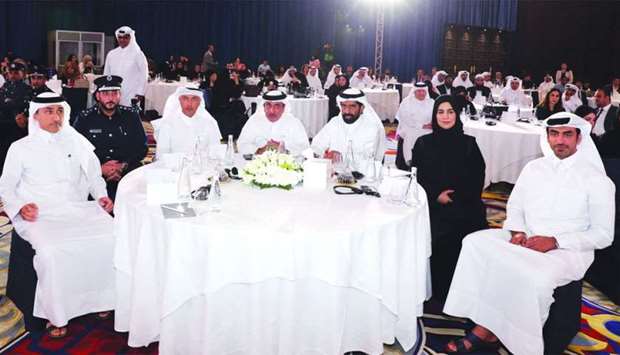The Ministry of Transport and Communications (MOTC) on Tuesday held the second annual ceremony of Qatar Digital Government (QDG) training programme, under the patronage of HE the Prime Minister and Minister of the Interior Sheikh Abdullah bin Nasser bin Khalifa al-Thani.
The ministry reviewed the training programme's achievements and announced new partnerships and training plans for 2019.
HE the Minister of Transport and Communications, Jassim Seif Ahmed al-Sulaiti, presided over the graduation of the first batch of the leadership development programme for ICT Executive Directors (24 graduates) and the second batch of the talented technology staff training programme (23 graduates), who are enrolled in the QDG programme.
Delivering a speech on the occasion, HE al-Sulaiti said that Qatar's adoption and use of technology in the government is similar to that of the developed world, which is reflected in country's classification in international indicators related to this matter.
But since technological innovations are dynamic, Qatar must always be on the cutting edge and keep abreast of these innovations if the country wants to stay among the pioneers in this field, he added.
The minister pointed out that while Qatar has taken an important step towards a smart government, it is necessary to emphasise the ministry's commitment to develop and train Qatari youth to enhance the future progress of the country and enable them to implement innovative digital solutions and enhance proficiency in the use of technology while reducing potential risks.
The minister stressed that through the provision of support and training for talented ICTs, from new graduates to executives working in this field, the Ministry of Transport and Communications is working to enhance the expertise required for them in the present and future, enabling the Qatari government to achieve growth and prosperity.
He stressed that profound changes can be made by investing in and providing training and support to ICT workers, and programmes such as QDG will help empower public sector employees and motivate them to use the technology available in their workplace to improve the efficiency of the implementation of the work according to the highest quality and maximum efficiency.
The minister pointed out that the digital government represents the future of government services in Qatar, and the country will continue this transformation successfully through the support and contribution of the concerned parties and all government bodies.
For her part, the Assistant Undersecretary for Digital Society Development Affairs at MoTC, Reem Mohamed al-Mansoori, reviewed the achievements of Qatar government's digital training programme in training ICT staff, noting that it had exceeded its objectives over the past three years, as it succeeded in providing 4,800 training opportunities, including 1,800 training seats in 2018, through the organisation of 312 training courses for more than 70 governmental and semi-governmental bodies, and 134 courses in 2018.
Al-Mansoori said that the programme has set the necessary facilities for the trainees to obtain about 380 international certificates, including 118 certificates during 2018.
In May 2014, Qatar launched Qatar e-Government 2020 strategy, which includes an integrated system of digital transformation and support the achievement of the strategic objectives, including the technological infrastructure and joint government applications, policies and standards that regulate and support the system, as well as the development of services for the benefit of citizens, businesses and visitors.

